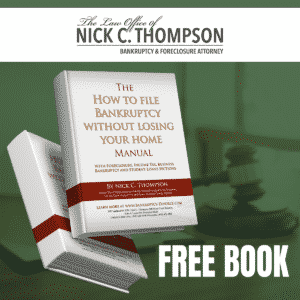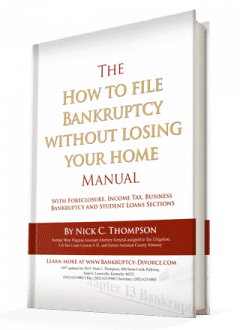Chapter 13 Bankruptcy does everything Chapter 7 does — only better. First, Chapter 13 has more tools to deal with a wider variety of problems that Chapter 7 doesn’t solve. Filing Chapter 13 can ensures a mortgage or car gets caught up over time. In addition, filing a Chapter 13 bankruptcy is appropriate if you don’t yet qualify for Chapter 7. You can only file one Chapter 7 every eight years, so if it has not been eight years, Chapter 13 is often your only choice. If this sounds like your situation, I invite you to continue reading to learn what you need to know about some of the increased benefits a Chapter 13 has.
Chapter 13 Bankruptcy Benefits
With a Chapter 13 bankruptcy, there are special benefits and tools that you don’t get with Chapter 7. Below is a list of some of the possible benefits you may expect with Chapter 13.
- Your credit recovers more quickly in Chapter 13 than Chapter 7. You can purchase a home in Chapter 13 after paying on time for at least a year. Some of my clients achieved a 720 FICO score while they were still in Chapter 13. If you file a Chapter 7, you must wait two years after that discharge to obtain a home.
- A Chapter 13 essentially works similarly to a consolidation loan. Debts like a mortgage may be paid outside the plan directly by the debtor. But primarily, Chapter 13 consolidates debts into one payment.
- Chapter 13 can allow a small mom-and-pop business to restructure. If a husband and wife or solely owned business need to restructure, it can’t file a Chapter 13. But the owners are often guarantors for the business, and they can file a Chapter 13. If there are no or few assets of the business, the business can continue to be owned and managed by them or closed.
Chapter 13 Bankruptcy Sets up Private Student loans to become uncollectible.
- Private student loans are often charged off by filing a Chapter 13. Private student loans are no different than credit cards, except that in bankruptcy, you cannot discharge private student loans unless you can prove undue hardship. If private student loans are in default status and there has been no judgment, filing Chapter 13 often adds five more years of non-payment to the loan.
- If you file a Chapter 13 before they a private student loan can get a judgment, they rarely file or refile a lawsuit to collect. When you exit Chapter 13, not paying these loans often runs the statute of limitations to end or bar collections. But the time you spend in Chapter 13 is not counted towards the statute of limitations. In Kentucky, private student loans are normally subject to the 6-year statute of limitations for negotiable instruments.
More Chapter 13 Bankruptcy Benefits
- Unsecured debts are paid normally a fraction of the amount owed with no interest in Chapter 13 over 3 to 5 years. Normally a Chapter 13 repays far less than debt settlements.
- You have the ability to stop a foreclosure and remove a Second Mortgage if the Second Mortgage has no equity in Chapter 13.
- Chapter 13 protects your property when you have too much equity. Assets which would be lost in Chapter 7, are often kept in Chapter 13, but you have to repay what Chapter 7 would have paid.
- Chapter 13 can protect a cosigner if the plan pays 100% of that debt. Plans can pay 10% or as less as 0% to unsecured creditors, but they can pay more to protect the comaker.
- Chapter 13 is voluntary and you can dismiss it. However, you cannot dismiss Chapter 7 if a Chapter 7 Trustee doesn’t allow it.
Still More Chapter 13 Bankruptcy Benefits
- You can eliminate or manage secured, priority, and non-dischargeable debts in Chapter 13. Even non-dischargeable debts are stayed from collecting while bankruptcy is ongoing. Income taxes, domestic support, taxes, and student loans can be repaid or managed in Chapter 13. Student loans and tax garnishments are stopped even if they are not discharged. Only evictions and child support continue without being stayed in Chapter 13.
- Priority and secured debts can be repaid at the expense of unsecured debts, often with no or reduced interest or penalties.
- The interest rates can be lowered for an auto, and payments can be stretched out.
- If you have negative equity in an auto and have paid the loan for over 910 days, the claim can be split into the secured and an unsecured portion.
⎆ The type of debts, assets, and disposable income control your payments in Chapter 13.
There is a cost to Chapter 13. If you want to take advantage of the benefits of Chapter 13, you must commit your disposable income to repayment for 3-5 years.
- In Chapter 13, the plan payments must repay priority debts such as income taxes that are less than three years old.
- A Chapter 13 also has to repay and catch up with secured creditors unless the property is surrendered.
- Chapter 13 must also repay what Chapter 7 would have repaid. So if you would have lost a $100,000 auto in Chapter 7, Chapter 13 could keep the auto, but you would have to repay $96,000 dollars. 100,000 – your 4,000 allowed exemption for an auto = 96,000.
- Again Chapter 13 has to repay the disposable income after reasonable and necessary expenses are paid.
 ⎆ One of the Chapter 13 Bankruptcy Benefits is you get the time you need to get back on track.
⎆ One of the Chapter 13 Bankruptcy Benefits is you get the time you need to get back on track.
The cause of bankruptcy is sometimes a temporary event. Bankruptcy cases are often due to divorce, disability, death in the family, or job loss. However, often, all you need is time to recover. In Chapter 13, you deal with your debts and put your finances back in order over time. And that is exactly what Chapter 13 bankruptcy provides – time without creditor harassment. In fact, often, you just need enough time to get your mortgage modification. Chapter 13 gives you that time.
The temporary court order that stops collections is much longer in Chapter 13 than in Chapter 7. The protection of the stay, which stops collections, lasts for 3-5 years. During that time, the debt is often charged off or sold to another debt collector, and the debt goes away. Often, nothing is repaid in Chapter 13 bankruptcy to unsecured debts. Plans for repayment are common at 10% or less— even 0% is possible. However, the secured and priority debts must be paid or brought up to date.
Not only does a Chapter 13 bankruptcy allow you to catch up on a mortgage or auto loan, but it can also pay back income taxes or provide temporary relief from student loans while eliminating credit cards and other unsecured debts.
⎆ Get your free consultation by calling 502-625-0905.
Half the attorneys who prepared bankruptcy cases quit in 2005 when the law changed. The new law required detailed and accurate petitions supported by documentation. In California, well over 50% of the petitions filed since 2005 have failed. Bankruptcy is not an area of the law where you can file a sloppy petition. You need someone who has experience and qualifications. Too often, attorneys lack the accounting and legal background to take on the banks.
After 2005 the Bankruptcy code changed again in December 2015 and December 2017 to even harder, longer, and more requirements for details in the plans and formats. Filing Chapter 13 comes with complications. In most cases, every attorney receives the same fee for Chapter 13 set by the court. Therefore, it costs you nothing extra to use the best attorney. Join the thousands of other happy clients and let us help you.
 Resources for Bankruptcy
Resources for Bankruptcy
Louisville Kentucky Bankruptcy Forms
Avoiding Foreclosure with Bankruptcy
Early Discharge for Chapter 13 Bankruptcy
Retirement Benefits & 401k in Bankruptcy
Including Income, Assets, Debts, and Expenses in a Bankruptcy
If you are thinking about filing bankruptcy, don’t delay because timing is crucial. I am here to help you. So, contact my office right away to start the conversation. Nick C. Thompson, Bankruptcy Lawyer: 502-625-0905.


